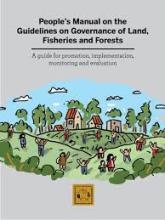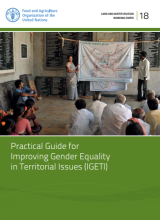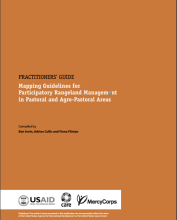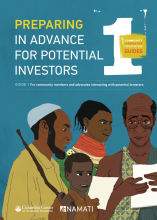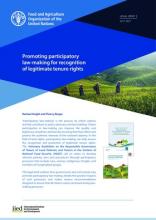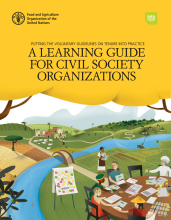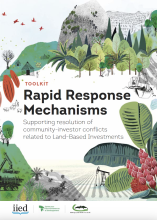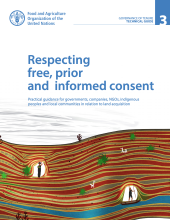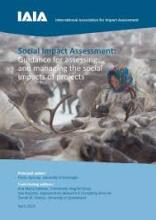Resources for Grassroots organisations
People’s Manual on the Guidelines on Governance of Land, Fisheries and Forests: A guide for promotion, implementation, monitoring and evaluation
The manual explains how to use the Voluntary Guidelines on Responsible Governance of Tenure in everyday life to protect the rights of peasants and other communities.
Practical Guide for Improving Gender Equality in Territorial Issues (IGETI)
This guide presents a people-centred gender approach to increase and improve the provision of goods and services from agriculture, forestry and fisheries in a sustainable manner while reducing rural poverty. It first introduces the proposed approach for improving gender equality in territorial issues, with specific guidance for each phase of the gender-response planning process. Then, it presents some available participatory tools to support planning of gender-responsive territorial development. It will be relevant to a broad spectrum of actors: government officials and policy-makers, civil society groups, development practitioners and consultants.
PRACTITIONERS’ GUIDE Mapping Guidelines for Participatory Rangeland Management in Pastoral and Agro-Pastoral Areas
This Practitioners’ Guide provides the step-by-step instructions and checklists that will guide a mapping team through a mapping exercise.
Preparing in Advance for Potential Investors - Guide 1 For community members and advocates interacting with potential investors
This guide for legal advisors, community leaders and members explains how communities can prepare for interactions with potential investors, including making decisions about whether or not to negotiate. It can be used to help a community: (a) prepare before an investor arrives and (b) decide whether or not to enter into discussions or negotiations with an investor that has arrived. It should be used before any negotiations start.
Primer on International Investment Treaties and Investor-State Dispute Settlement
This primer gives an accessible overview of key aspects surrounding International Investment Treaties and Investor-State Dispute Settlement, and the implications for promoting a rights-based approach to governance.
Promoting participatory law-making for recognition of legitimate tenure rights
"Participatory law-making” is the process by which citizens actively contribute to policy advocacy and law-drafting. Citizen participation in law-making can improve the quality and legitimacy of policies and laws by ensuring that they reflect and protect the authentic interests of the national citizenry. In the field of land rights, participatory law-making can help ensure the recognition and protection of legitimate tenure rights. The Voluntary Guidelines on the Responsible Governance of Tenure of Land Fisheries and Forests in the Context of National Food Security (VGGT) call on states to develop relevant policies, laws and procedures through participatory processes that include men, women, Indigenous Peoples and members of marginalized groups.
Putting the Voluntary Guidelines into Practice: A Learning Guide for Civil Society Organizations
This learning guide provides civil society organizations (CSOs) with a methodology and a set of materials to undertake training on the VGGT with civil society actors from the grassroots to the national level. Trainees will learn how to apply the VGGT to actual tenure governance challenges.
Rapid Response Mechanisms: Supporting resolution of community-investor conflicts related to Land-Based Investments
Often, approaches to investment-related land rights violations are reactive, rather than proactive and preventative: legal support is usually provided after communities have been negatively impacted, displaced or evicted — and after lives have been lost, property destroyed, local waters and soils polluted, and communities devastated. In such cases, legal support has a limited chance of reversing the damage caused.
To address this challenge, rapid response mechanisms (RRMs) are designed to ensure that community members can reach out for legal and technical help the moment a conflict arises, and/or as soon as their rights are threatened or violated — and for advocates to respond quickly, in order to preventatively resolve a potential conflict before major harm has been done and before it escalates.
This toolkit, based on direct field experience, provides guidance on how advocacy organisations might create rapid response mechanisms in a wide range of contexts.
Respecting free, prior and informed consent
This technical guide sets out practical actions for government agencies, civil society organizations, land users and private investors globally to respect and comply with their responsibilities in relation to FPIC. It
• translates principles of responsible land governance and tenure (see the VGGT) into practical mechanisms, processes and actions,
• gives examples of good practice – what has worked, where, why and how, and
• provides useful tools for activities such as the design of policy and reform processes, for the design of investment projects and for guiding interventions.
Social Impact Assessment: Guidance for assessing and managing the social impacts of projects
This Guidance Note provides advice about what is expected in good practice social impact assessment (SIA) and social impact management processes, especially in relation to project development. It is intended for private sector actors, government agencies, development banks and agencies, civil society organisations, and service providers. It provides guidance to help reduce companies' risk exposure and assist them in being compliant with international standards and/or good practice as they evolve over time by addressing significant human rights issues associated with a project.


